Instructions for young mothers: how to brew dill for newborns from colic and apply it correctly
Intestinal colic in children in the first months of life is a fairly common occurrence. It is associated with the immaturity of the digestive system and is accompanied by paroxysmal pain in the abdomen. Treatment of intestinal colic in infants provides for the mother's diet, correct selection of infant formula, adherence to feeding techniques, taking probiotics, carminative and antispasmodic drugs. One of them is a herbal remedy - dill water. You can buy it at the pharmacy or prepare it yourself at home.
In the article we will talk about the benefits and dangers of dill for the digestive tract, we will learn how to prepare and take a decoction of dill seed for an infant, as well as the conditions and shelf life.
The content of the article
Does dill help newborns with colic?
In folk medicine, dill is used as a medicinal raw material, with the help of which it is possible to improve the functioning of the intestines and reduce the accumulation of gases in infants.
For the preparation of dill water, ripe fruits or fennel herb are used. All parts of the plant contain flavonoids, essential oil, pectin substances, carbohydrates, a set of mineral salts, vitamin A, ascorbic and nicotinic acids. Together they improve the functioning of the digestive system, eliminate and relieve painful stomach cramps, regulate gas metabolism, and relieve irritability. Fennel fruits are offered to children both during an attack of intestinal colic and to prevent their appearance.
Positive reviews from a large number of parents confirm the effectiveness of fennel in the treatment of intestinal colic in children in the first months of life. However, to achieve a positive result, an integrated approach is important: a nursing mother's diet, abdominal massage to remove gas and improve intestinal motility, the correct choice of infant formula and adherence to feeding techniques.
Negative reviews are rare and are mainly due to the fact that the medication was ineffective and difficult to give to the newborn.
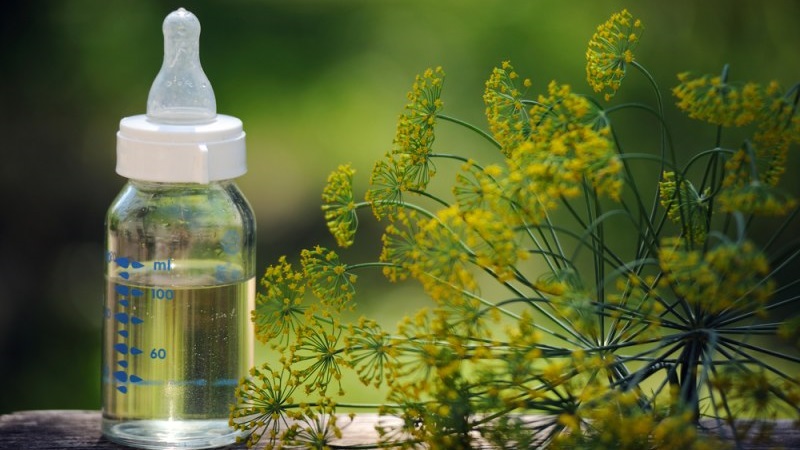
Principle of action and benefits
Due to the diverse set of biologically active components, the consumption of dill normalizes metabolism, improves the motility of the digestive tract, and enhances the secretion of the digestive glands.
All parts of the plant have an expectorant, antispasmodic, choleretic, antibacterial and sedative effect. In addition, fennel is used to normalize appetite and digestion, it is advised for lactating women in order to improve lactation.
Side effects when observing the technique of preparing dill water and the scheme of application are extremely rare. In isolated cases, skin rashes, itching, urticaria are possible.
Dill herb application
Dill grass is more often regarded as a valuable food product. Its use can satisfy the body's need for ascorbic and nicotinic acids, calcium, potassium, iron, phosphorus and other useful elements.
In cooking, the herb is used fresh, dried or salted, in various mixtures of spices, for cooking, pickles and conservation.
Reference. The leaves contain phytoncides, which, when salted, not only give a specific taste to the product, but also prevent spoilage and the appearance of mold.
Using dill seed
In folk medicine, dill fruits are used as a medicine. They are part of sedatives, laxatives, carminative and choleretic charges. Dill seed is processed into oil, which is the main component of such preparations as "Dill water" and "Anetin".
In addition to the diuretic and antispasmodic effect, dill seeds are used as a powerful antioxidant for prevention and treatment. diseases digestive system and upper respiratory tract.
The fruits of the plant have a beneficial effect on the general condition and function of the myocardium, increase the elasticity of the vascular walls, and stimulate hemodynamic processes. Due to this, they are widely used in the treatment of atherosclerosis, ischemia and heart failure.
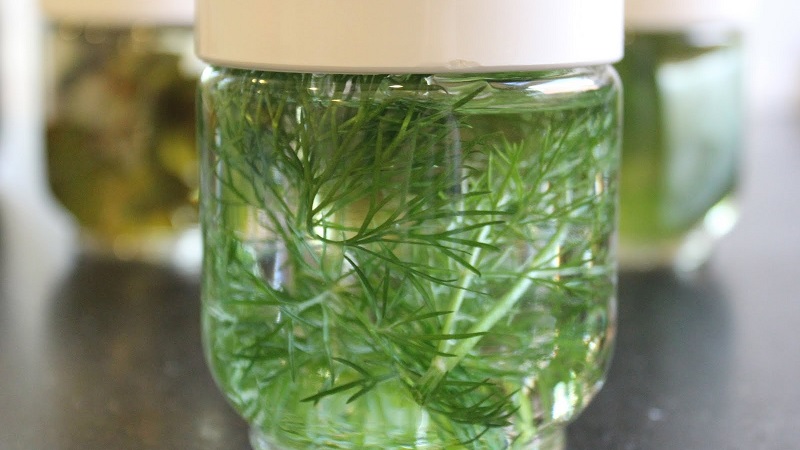
Purchased dill water
It can be difficult to find dill water on sale, especially in small settlements: it is prepared where there is a recipe department. The average price of a 100 ml bottle varies around 150 rubles, fennel seeds (40 g) are three times cheaper.
The composition is simple: purified water and dill oil. It goes on sale in glass bottles, packaged in cardboard packaging. Dill water is used to treat adults, newborns and older children with problems with Gastrointestinal tract.
Reference. An analogue of "Dill Water" is on free sale - granules for preparing a solution for oral administration "Plantex" based on essential oil and fennel fruit extract. This remedy is allowed for children from the first days of life.
Home cooked
There are several ways to brew dill for newborn colic at home. Next, we will look at two main recipes: infusion and decoction. The medicine is prepared from purchased dill seed or grown independently. It is recommended to use only distilled water.
Important! The seeds are harvested when they begin to ripen. The inflorescence must be cut off, placed in a paper bag or tied in a bunch, left in a warm and dry place for 5-7 days. Separate dry seeds from the stems and store in an airtight container.
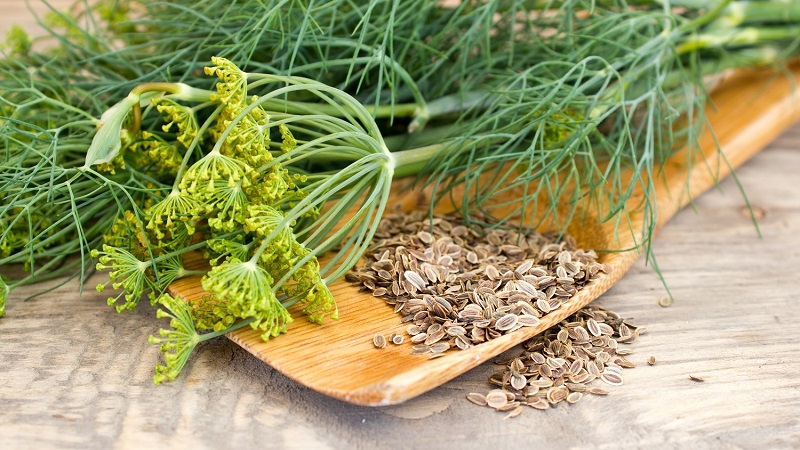
How to properly brew dill for a baby
Let's look at two main recipes:
- 1 tbsp. pour a spoonful of dill seed with 1 liter of cold water, put in a water bath. From the moment of boiling, keep on low heat for a quarter of an hour. Cool the broth, strain through cheesecloth or sieve.
- 1 tbsp. pour 1 liter of boiling water over a spoonful of fennel seeds, cover with a lid, leave for an hour. If large leaves of the plant were used, the infusion time must be increased to 1.5-2 hours. Give infants a strained infusion.
Fennel essential oil is often used to prepare dill water. To do this, 0.05 g of oil must be dissolved in 1 liter of purified water. Store the finished product in the refrigerator for no more than 30 days. Before use, a single serving should be warmed to room temperature.
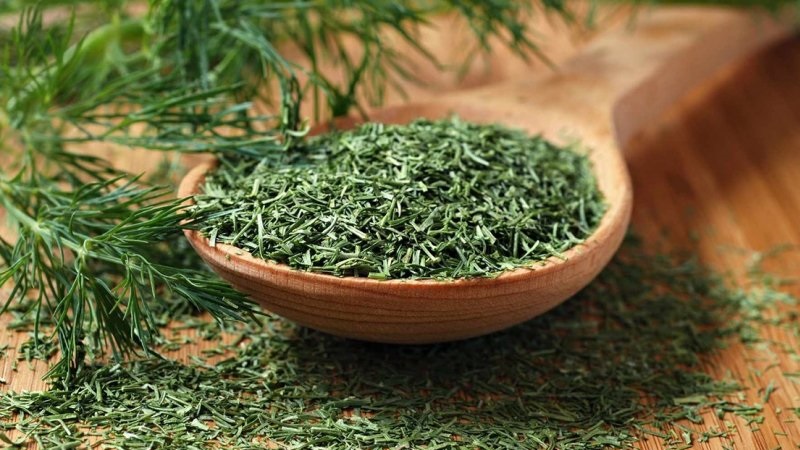
Instructions for use
According to the instructions for use, "Dill water" should be given to the baby 1 teaspoon every 2-3 hours before feeding, using a syringe, spoon, bottle or instilling 10-15 drops on the tongue. The effect of the drug is noticeable after 20-30 minutes. The product can be offered neat or diluted in breast milk or infant formula.
Dill water, prepared at home, is taken for therapeutic purposes according to the following scheme: 50-100 ml in small portions during the day. For prophylaxis, a dose of 40-60 g, divided into 2-3 doses, will be effective. Fresh medicine must be prepared every day. The rest of the broth can be consumed by a nursing mother to improve lactation and normalize digestion.
Precautions
An absolute contraindication for taking dill water is individual hypersensitivity to one or more components of the composition. To eliminate the likelihood of allergies, it is necessary to start treatment with minimal doses, gradually increasing the one-time and daily rate. When signs are found allergies you should stop taking the drug and consult a pediatrician.
Terms and conditions of storage
Pharmacy dill water should be stored in the refrigerator for no more than 30 days. Self-collected and dried dill seed should be stored for up to 24 months in a sterile container with a lid in a dry and well-ventilated area.
Dill fruits purchased from a pharmacy, must be stored at a temperature not exceeding 25⁰С and relative humidity not exceeding 70%. The shelf life is two years.
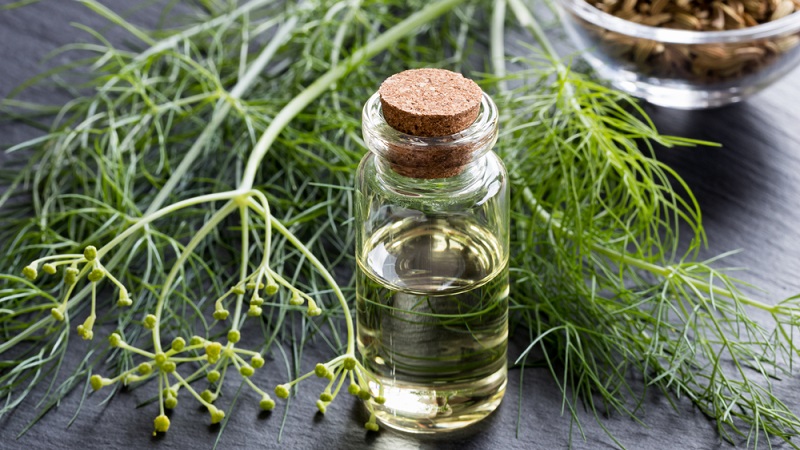
Conclusion
Pharmaceutical dill water or prepared at home is an effective remedy for the treatment and prevention of intestinal colic in newborns. Fennel has a carminative and choleretic effect, normalizes the secretory function of intestinal motility, improves the activity of the gastrointestinal tract glands, which has a beneficial effect on digestion processes. Most parents leave good reviews about the effect of dill water on intestinal colic.
There are practically no reviews related to the appearance of side effects, which indicates the safety of using the product. At the same time, in order to get the maximum benefit and not harm the child's body, the question of the advisability of using dill seed for the treatment and prevention of colic in the case of a particular child should be discussed with the pediatrician.